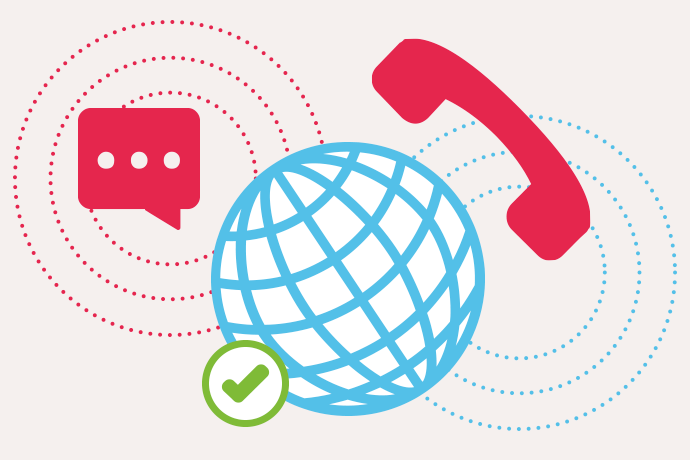Cart Total
$0.00
-
Your shopping cart is empty
Loading

Hello! Log in Your Account
New customer? Start here


|
6 min read
Contents
Quick Summary
With the upcoming switch from PSTN to VoIP, we look at what processes other countries have taken when they decided to migrate their own copper line networks.
While the UK is set to fully switch off the Public Switched Telephone Network (PSTN) in 2027, other countries have already forged ahead and withdrawn PSTN in order to meet the demands of businesses today.
A host of European countries such as the Netherlands, Estonia, and Germany have switched to IP phone networks, with Norway, Spain and Portugal not far behind. Further afield, Singapore has already switched off PSTN, with Japan and Australia targeting completion dates within the next 2-3 years.
With several countries already retiring or in the process of retiring their copper line networks, what learnings can be taken onboard for the UK’s own move towards VoIP and digital phone lines?
Switching the country from PSTN to digital IP networks has been a long process for BT, with the initial announcement coming as far back as November 2017.
Germany’s Deutsche Telecom learnt from their smaller network operations in Croatia and Slovakia before migrating PSTN services in Germany. Estonia also took a gradual approach and switched off their copper-based network over a three-year process. Similarly, two years prior to the switch off date, from April 2023, the UK has commenced phasing out PSTN in the Salisbury and Mildenhall area exchanges.
In Spain and Portugal migrations have been aided by the high competition between fibre-based and ultrafast broadband services. In the UK, Openreach has been steadily expanding Fibre to the Premises (FTTP) and is aiming to deliver ultrafast fibre to up to 25 million premises by the end of 2026.
These improvements will ensure a speedier, more reliable network where Cloud-based digital communications can further grow and flourish.
Argentina have just announced the sunsetting of their copper network, however no timeline has been given as yet. With communication changes this large, it makes sense to move methodically, as the UK has been doing, so no one gets left behind.
Recent rises in remote and hybrid working mean that businesses in the UK are now far better equipped and ready for these upcoming changes than perhaps countries who switched much earlier on.
While the switch to digital lines and VoIP phone systems will bring a host of advantages to businesses, it is still important to take note of what other services may need additional consideration ahead of your move. For example, some alarm systems or restaurant card machines may still utilise copper landline connections.
Some newer alarm system solutions however, are designed to utilise cellular communication modules or IP communicators instead of traditional phone lines. There are even existing models that allow you to upgrade just the communication module instead of upgrading to a new system. Ensure you speak to your providers to get the solution that’s best suited to combine with a reliable VoIP solution and best for your business.
Discover your alternatives to landline phones ahead of the 2027 switch off and get ahead of the pack today.
More and more businesses are accustomed to Cloud solutions and remote collaboration than ever before. VoIP systems were widely adopted as a result of the surge in remote working over the last few years. Our own Cloud phone system handles in excess of 20 million average managed calls a month, so you can be sure VoIP is no longer the new kid on the block.
As an organisation, this is your opportunity to improve your existing business communications. Cloud-based VoIP solutions open up a host of features that may otherwise have either been too costly or required specialist knowledge to set up.
This means that it’s a great time to consider whether your customers would benefit from an in-call menu that directs them to the department they need in just a matter of minutes. Could staff benefit from real-time call monitoring where new starters are able to be mentored and assisted live on a call?
Deciding what your business requirements are now will allow you to move at your own pace, lay future groundwork and find the right solution for you.
The possibilities with VoIP are continually growing and it’s an exciting time to take a step into its digital possibilities.
While global country-wide migrations to digital phone lines have taken a multi-year approach, the process for switching your business from PSTN to VoIP needn’t take anywhere near as long.
Due to the flexibility and scalability associated with Voice over IP phone systems, VoIP providers can seamlessly migrate existing PSTN phone numbers via an online process, without the threat of existing lines experiencing any downtime.
Moving early means freeing up budget that would have been spent maintaining soon-to-be defunct technology. Upgrading in advance also ensures that you can make the most of the extra features and versatility that IP communications provides. The PSTN switch off is a catalyst for change and it will further the delivery of new technology to your teams, improving collaboration and connection wherever they’re based.
From the increase in faster FTTP connections across the country, through to the availability of comprehensive Cloud solutions and VoIP phone systems to businesses nationwide, you can be confident that upgrading your company to a digital phone line will be a beneficial move towards the future. Take Jersey for example, which switched from PSTN early, and underpinned this with full fibre rollout, they soon found that they were subsequently able to offer better quality services at a faster pace as a result.
So, while you might need to take some time to consider which Cloud-based VoIP solution is the best fit for your company in our ever connected and competitive world, there’s no reason to put change on hold, and no reason not to hang up on PSTN.


Explore how Skype's end-of-life announcement presents an opportunity for small businesses to upgrade their Skype number to a VoIP phone system.
Posted March 10 2025 | 5 min

Everything you need to consider when moving offices, from hardware to call quality.
Posted January 16 2025 | 6 min

Corded headsets vs wireless headsets? Learn about the key considerations when purchasing a VoIP headset for your VoIP phone system and softphone apps.
Revised December 3 2024 | 9 min

VoIP is incredibly well suited to being the phone system for businesses of all sizes. Large businesses in particular can benefit from great scalability, bulk-deployment options and more.
Revised August 21 2024 | 8 min

Examining the differences between VoIP and PSTN communications solutions and VoIP benefits.
Posted July 16 2024 | 5 min

Get your business up to speed before the PSTN and ISDN switch off in 2027. Discover what digital VoIP technologies will mean for business landlines in the future.
Revised July 15 2024 | 6 min

VoIP apps or VoIP desk phones, which is better and why? We discuss how VoIP desk phones could be obsolete with the availability of greater and more powerful VoIP apps .
Revised November 2 2022 | 7 min

Cloud VoIP phone systems offer key advantages for businesses. Here are 13 of VoIP's key benefits that have helped to drive the adoption of business VoIP.
Revised May 10 2022 | 12 min

How cost-effective is VoIP? Is VoIP secure? How fast does my Internet need to be? We answer these questions and more.
Posted January 11 2022 | 5 min

VoIP won't work without the internet, but that doesn't mean you need a wired broadband connection. A supplemental mobile cellular data network (4G, 5G, LTE) can make VoIP calls possible even if broadband is unavailable.
Posted January 11 2022 | 5 min

Offer great customer service, but do so efficiently. Automate aspects of your phone system and provide self-service information to free staff resources.
Posted September 24 2021 | 4 min

Call recording is a feature of good VoIP phone systems that allows customers to record their business calls, then playback and download them.
Posted September 17 2021 | 6 min

Large corporations have requirements that surpass the capabilities of most phone systems. With Yay.com build your ideal business phone system effortlessly.
Revised August 25 2021 | 5 min

A good business phone system will help you run day-to-day operations more efficiently and effectively. Here are 5 ways yours can improve customer satisfaction.
Posted August 19 2021 | 4 min

Features like call parking and shortcodes can boost the efficiency of your business phone system, saving your teams time.
Posted August 18 2021 | 6 min

Learn what VoIP 'QoS' or Quality of Service is and why your business network needs it configured for the best VoIP experience.
Posted March 9 2021 | 3 min

With Yay.com's free VoIP trial you can try business VoIP for free for fourteen days - no credit card required. Enjoy all of our powerful business phone system features at no cost.
Posted December 3 2020 | 4 min

Business VoIP makes it possible to work from anywhere. We'll get you up and running for working from home, no matter whether you prefer VoIP desk phones or VoIP apps.
Posted November 12 2020 | 3 min